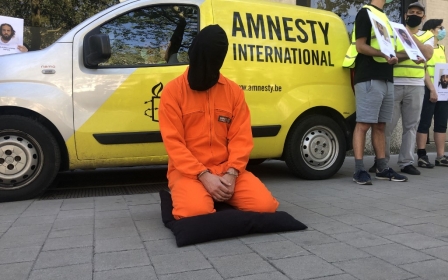Guantanamo Bay: US military jury condemns detainee's torture

A jury of US military officers has issued a sharp rebuke of the treatment of an inmate at the Guantanamo Bay prison and offered an appeal for clemency, after hearing his testimony last week where he openly described his torture at a number of CIA black sites.
In a letter urging mercy in the case of Majid Khan, a Maryland resident who admitted to being an al-Qaeda courier, seven officers out of an eight-member jury condemned the detainee's brutal treatment, calling it a "stain on the moral fiber of America".
"Mr Khan was subjected to physical and psychological abuse well beyond approved enhanced interrogation techniques, instead being closer to torture performed by the most abusive regimes in modern history," the handwritten letter read, which was obtained by The New York Times.
'The treatment of Mr. Khan in the hands of US personnel should be a source of shame for the US government'
- Panel of US military jurors
The panel also responded to Khan's claim that after his capture in Pakistan in March 2003, despite telling the interrogators everything he knew, "the more I cooperated, the more I was tortured".
"This abuse was of no practical value in terms of intelligence, or any other tangible benefit to US interests," the letter said.
"Instead, it is a stain on the moral fiber of America; the treatment of Mr Khan in the hands of US personnel should be a source of shame for the US government."
The officers also noted that the inmate was held without due process and denied access to a lawyer, which they said was a “complete disregard for the foundational concepts upon which the Constitution was founded” and “an affront to American values and concept of justice".
They said Khan "expressed remorse for the impact of the victims and their families. Clemency is recommended".
A powerful message
The clemency request was the first of its kind made at the military court at Guantanamo, and while it is nonbinding, it serves as a powerful message to the war court of the CIA's treatment of detainees.
Ian Moss, a former Marine who is a civilian defence lawyer for Khan, told The New York Times that the letter is "an extraordinary rebuke".
"Part of what makes the clemency letter so powerful is that, given the jury members’ seniority, it stands to reason that their military careers have been impacted in direct and likely personal ways by the past two decades of war," he said.
Last week, Khan, 41, became the first former prisoner of the CIA's clandestine overseas prison network to openly testify about his treatment there, in which he says he was waterboarded, sexually abused, suspended naked from a ceiling beam for long periods, and subject to sleep deprivation for days.
"I thought I was going to die," he told the jury.
After being captured in 2003 and being transferred to a number of CIA black sites, he was sent to the Guantanamo Bay prison in 2006 for trial. In 2012, he pleaded guilty to charges that include conspiracy, murder and providing material support to terrorism.
The panel of jurors issued a 26-year sentence for Khan. However, this was mostly symbolic as a plea deal was reached that would see his actual sentence end as early as February 2022 and as late as 2025 - due to Khan's cooperation with the US government.
He will likely be resettled in a third, as yet unknown country, because he cannot return to Pakistan where he has citizenship.
The sentencing was the most recent case in the slow-moving military commissions process at Guantanamo Bay, where two out of the nearly 800 people sent to the prison were convicted, while another 10 are awaiting trial.
The Biden administration has stated its goal to empty the prison, and so far has released one prisoner. Thirteen of the detainees have been approved for transfer and are awaiting their release, while another 14 are currently being held indefinitely.
Middle East Eye propose une couverture et une analyse indépendantes et incomparables du Moyen-Orient, de l’Afrique du Nord et d’autres régions du monde. Pour en savoir plus sur la reprise de ce contenu et les frais qui s’appliquent, veuillez remplir ce formulaire [en anglais]. Pour en savoir plus sur MEE, cliquez ici [en anglais].





